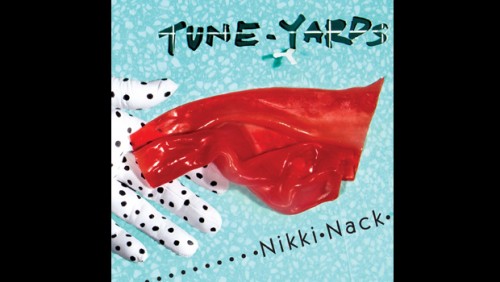By Emily Votaw
Merrill Garbus has made a lot of odd records that somehow manage to mesh the ever-important aspects of catchiness and playful weirdness into something that is incredibly gratifying and fascinating all at once. “Nikki Nack” cements Garbus’ place as one of the most diverse and interesting musical forces right now. She’s not a fluke, she’s not a poser, and it’s no one’s imagination that her latest effort is something to behold.
“Whokill,” her 2011 release, and debatably the record that opened her up to broader exposure, was a bizarre but stunning mesh of Mahlathini-style vocal riffs and quick, accurate South African pop-inspired guitar — something unlike anything else the crowd of hipsters that embraced her perfectly strange indie pop had ever heard. “Nikki Nack” may be the reserved, vaguely more philosophical sister of “Whokill,” a different but equally satisfying counterpart. Where “Whokill” occasionally tipped into slightly embarrassing but audibly interesting territory (“Gangsta,” aspects of “Doorstep”), “Nikki Nack” expertly tiptoes around such flub-ups, never leaving the listener with anything resembling a cringe.
“Time of Dark,” a track settled in the first half of “Nikki Nack,” utilizes more obviously electronic soundscapes than “Whokill” ever did, with an opening guitar drone that approaches something The Cure would have utilized for their eclectic and vaguely world music inspired “Head on the Door” album. Garbus tunefully supplies vocals that oscillate from echo-y climax to perfectly controlled almost whispering, all over a platform of constantly moving rhythmic collage of sound. The track sounds less optimistic than anything on “Whokill,” dire lyrics that sound neither like a celebration nor a lament, but a statement of fact.
“Nikki Nack” is saturated with this type of sound. Although the album does have moments that are so loud and exuberant they can’t not sound like festivity, notably “Real Thing” (which does have an oddly realistic set of lyrics for a song that sounds so excited), even those tracks are tempered by a sense of world weariness. “Real Thing” questions what exactly the “real thing is,” and the track flows into “Look Around,” which questions much of the same thing. The song has quite a resemblance to portions of “Whokill,” especially the quieter, minimalist songs from that album, “Doorstep” and “Powa.”
Although “Nikki Nack” is less optimistic than “Whokill,” it still has moments that seem like a direct, wonderful but forgotten track from some lost Earthworks label albums. “Water Fountain” has a playful, almost folk song quality that sounds like someone rerecorded one of the oddball slice of life songs from “The Indestructible Beat of Soweto” with the English translation lyrics. “Nikki Nack” sounds progressively more mature than “Whokill,” dealing many of the same hands that Garbus has dealt on her previously released albums with a dark but ultimately refreshing twist.
“Hey Life” takes this dark outlook further with opening lyrics that can’t really be misunderstood: “Hey life, I am calling your name/ But all I hear is an echo/ Unless your voice and mine sound the same,” words that summarize and beautify the oddity of existence within a pop song. Garbus seems to feel lonely, but it has yet to bother her. On “Look Around” she sings that “On one hand there is what sounds good/ And on the other there is what is true,” and it seems like Garbus has finally found a way to combine the two.
Rating: 75/81




Leave a Reply